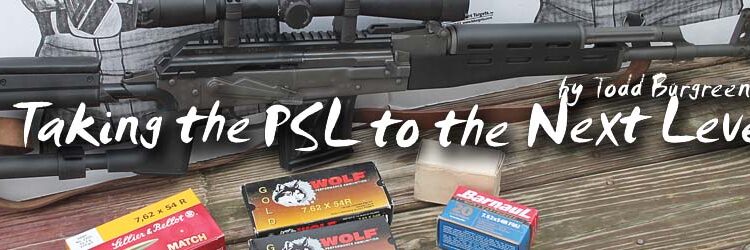By Todd Burgreen
The PSL rifle chambered in 7.62x54R was introduced into Romanian military service in the mid-1970s. The mission description for the PSL is closer to what we would label a designated marksman’s weapon versus as a true sniper rifle. The current offering of PSL rifles in the U.S. market has to be considered a great purchase for someone desiring a working example of a Cold War Communist Bloc weapon. The PSL rifle has always been a surprising performer considering its “bastard” heritage compared to the more infamous Soviet/Russian SVD Dragunov. The PSL utilizes the basic AK operation with piston operating rod and bolt carrier connected. The PSL’s receiver is reinforced front and rear due to it being “stretched” in order to accommodate the longer and beefier 7.62x54R cartridge compared to the 7.62×39. Anyone looking for a hard-hitting, high capacity semi-automatic rifle would do well by not overlooking the PSL. This stems from the PSL’s well earned reputation for ruggedness and reliability combined with the 7.62x54R cartridge. The added bonus is you are getting a magazine fed semi-automatic rifle chambered in a potent cartridge with enough accuracy allowing for hits on man sized targets out to 600 yards.
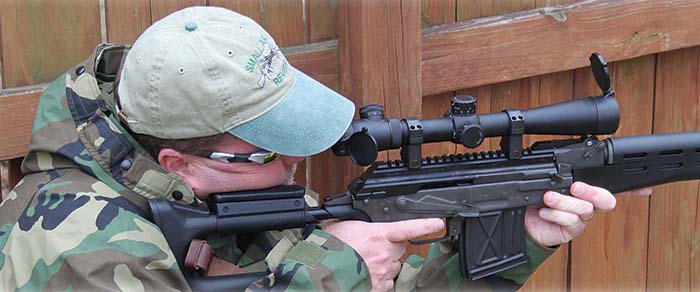
The PSL used for this article was imported by Century International Arms and labeled as PSL-54C. The PSL acronym stands for “semi-automatic rifle with scope” in Romanian. The base PSL rifle acquired came with two 10-round magazines, a Romanian LPS-1 optic manufactured by IOR, magazine pouch, cleaning kit, and sling. Basic PSL dimensions are 10.25 lbs with a 24.4 inch barrel and an approximately 2 inch muzzle brake giving overall length of 46 inches. The LPS-1 optic is mounted on a side rail on the left of the PSL’s receiver. The Russian style PSO reticle in the LPS-1 features range finding markings and hold over chevrons. The optic’s reticle was originally illuminated via tritium, but the tritium has since expired eliminating the illuminated reticle feature. While the PSL resembles a SVD Dragunov externally, it is totally dissimilar in operation under the hood. SVD Dragunov’s are rare and expensive in the U.S. market, with the PSL more than glad to fill in for it. Several fundamental differences exist between the PSL and the SVD. The PSL operates via the Kalashnikov long-stroke gas piston bolt carrier system inside a stamped receiver more similar to the reinforced RPK light machine gun than a standard AK, where as the SVD is a short stroke operating system utilizing a milled receiver. Trigger group designs are different between the PSL and SVD as well. The PSL and SVD both operate with 10-round detachable box magazines though the magazines are not interchangeable between weapon systems. On the whole, quality control for the Russian SVD is of a higher standard than the Romanian PSL and this aids the SVD in a more consistent accuracy reputation compared to the PSL. However, range experience and research leads to the belief that the accuracy potential of the PSL is under-rated. The Romanian decision to utilize simpler manufacturing techniques with the PSL versus more complex Russian SVD seems justified. The PSL starts with one basic advantage due to the AK operating system – reliability.
Critics/naysayers of the PSL point to the maxed out receiver combined with much longer operating rod as imposing stress on the action impacting accuracy. The long and relatively thin 24.4 inch barrel with 2-inch long brake on the end would seem only to accentuate this tendency. Slow motion video capturing a PSL while firing supports this notion. The PSL defies this logic by often performing better than expected, but below what U.S. market would consider a precision rifle. However, attention to detail such as ammunition supply, better stock system, finding a way to mount a better optic than the normally supplied Com Bloc 4x scope, and action fine tuning being pioneered by noted AK system gunsmith Jim Fuller’s Rifle Dynamics will bring out the full potential of the PSL.
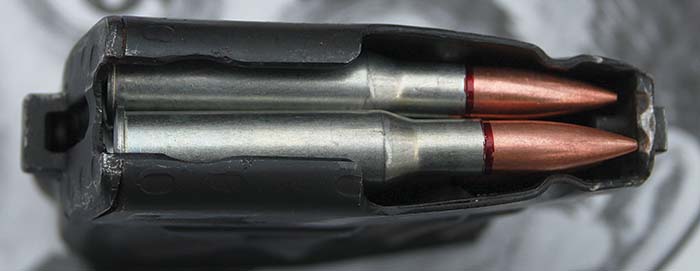
A simple performance enhancement for the PSL would be to create a “flat-top” like Picatinny rail for mounting optics or other aiming devices. The inability to mount optics on the PSL over the receiver via Picatinny rail a la AR dissuades U.S. shooters against the PSL; not to mention inhibiting maximizing the PSL’s true field accuracy. The true hallmark of Soviet-era designs gaining acceptance in the U.S. is the rise of gunsmiths and aftermarket accessories starting to cater to its clientele. Texas Weapon Systems (TWS) is the poster child for what innovations are possible once enough demand is exerted from the market. TWS started with a Dog Leg Scope Rail with integral dust cover enabling AK connoisseurs to enhance their weapons capabilities with minimal fuss without sacrificing hallmark AK reliability and handling. It made business sense to concentrate on the more prolific AK model before the PSL due to AK quantities far exceeding PSLs in the U.S. The TWS Dog leg replaces the AK/PSL standard dust cover providing a Mil-Std 1913 rail mounting surface. In effect, it turns an AK or PSL into a flat top receiver with all the advantages associated with mounting magnified scopes, red dots and other optic options. Earlier experiences with TWS Dog Leg covers on AKs had set high hopes that TWS would turn its attention to the PSL rifle – which they finally have. Ultimately, the TWS Dog Leg offers shooters flexibility in setting up their PSL to desired personal preference. TWS offers a rear peep sight option as well for anyone wanting to maintain back up iron sights (BUIS) in case an optic fails. The extra sight radius offered by mounting the TWS peep sight at the end of the receiver compared to normal rear sight location is a worthy enhancement in its own right.
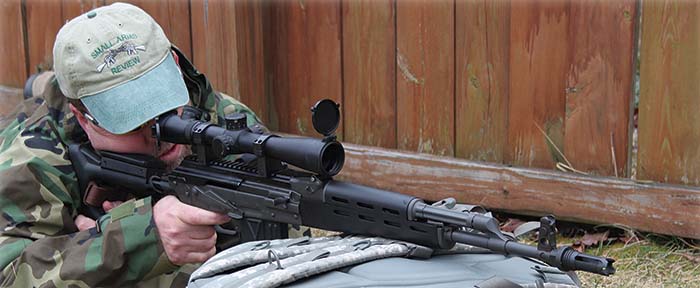
TWS literature states it best by describing how its “joggle” shaped pivot, i.e. dog leg, replaces the rear sight block in front of the receiver and cam action lock release button replaces the existing dust cover release button. The TWS dust cover hinges similar to the dust cover found on Krinkov AK models allowing for weapon cleaning and other maintenance chores. The key aspect of the TWS offering is that it does not disturb a mounted sight’s zero. As proofed on two separate AKs before trying the PSL version, the TWS Dog Leg does indeed enable repeatable accuracy. This is achieved by a self centering mechanism designed into the TWS dust cover combined with spring tension once the cover is closed. What makes the TWS stand out is how the Dog Leg design enables the same dust cover height as a standard cover thus optics are placed low enough that a proper cheek weld is maintained. Another key point is that the TWS version is relatively economical compared to other offering while still maintaining sturdiness and no shift of optic zero. The TWS Dog Leg is truly so simple that it is brilliant. The TWS Dog Leg is constructed from aircraft grade aluminum alloy 6061-T6 and is hard black anodized, which can stand alone or be painted to user preference.
The PSL used in this article was purchased several years ago and has undergone several stages of development. The original urge was for a SVD, but pricing and availability prevented this. Discovered handling and performance of the PSL assuaged any feelings of regret of not spending several thousand dollars on a SVD. Surplus ammunition intended more for PKM belt fed machine guns delivered 4-inch groups with the 4x scope. Zeroing in the LPS scope proved more of a challenge than anything else. The windage and elevation turrets operate via different mechanisms than more accustomed to Western type optics, not to mention how the scope sat to the left side of the receiver. The stock’s length combined with short eye relief of the LPS-1 scope proved something that had to be adjusted to as well. Handling of the PSL was above average considering its size and weight. The PSL’s “wispy” barrel keeps weight centered around the receiver compared to the front heavy feel found on most tactical bolt actions. Recoil was manageable and in no way harsh. The Tapco G2 trigger group was gritty with creep but serviceable.
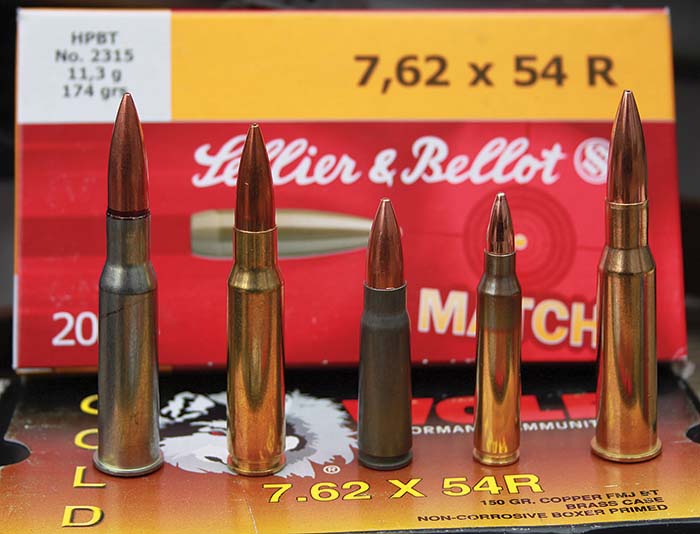
Interest in the PSL was revived after running across several posts on Suarez International’s Warrior Talk Forum highlighting the “Guerrilla Sniper Rifle” (GSR) concept. The GSR is a rifle, preferably a semi-automatic, with accuracy standards of headshots at 200 yards and solid body hits out to 600 yards under field conditions. While not strictly defining what weapon is best, Suarez International was quick to seize on the PSL’s capabilities and cost effectiveness. The idea, or need, for maintaining sub-MOA accuracy at 800+ yards is unfounded for most. This type of accuracy is very expensive and frankly most users are not capable of taking advantage of this accuracy level. The PSL’s intended role of augmenting AK47/74 effectiveness with its superior long range capability makes it a natural candidate for a GSR, especially with readily achievable improvements in ammunition, optics, and rifle itself. While not as accurate as a bolt action rifle, the PSL offers much more firepower and could be used in any chance encounters much more effectively than a bolt action rifle.
Jim Fuller’s Rifle Dynamics was a natural to become involved with the Suarez “Guerrilla Sniper” concept and designed an accuracy enhancing package for the PSL. Rifle Dynamics is one of the premier AK gunsmiths in the U.S. and they are 07FFL/SOT manufacturers, which allows for work on machine guns, suppressors, SBR’s and SBS’s combined with being considered a dealer as well. The Rifle Dynamics’ PSL package consists of:
- Shorten barrel to 19 inches
- Cut 11 degree target crown on barrel
- Re-thread barrel for muzzle device
- Uncant sights/gas block
- Modify rear sight
- Correct breach face
- Correct bolt face
- True/fit bolt carrier/locking lugs
- Re-headspace and pin barrel to proper spec
- Adjust trigger group
- Fit/smooth safety
- Properly fit magazine catch
- Deburr PSL, including trigger guard, charging handle, and magazine catch
- Sandblast and Parkerize all metal parts
- 25 yard zero iron sight verification
Even without firing a live round the Rifle Dynamic modifications could be detected in the smoothness of the action, trigger pull, quality of re-finish and overall weapon feel. The shortened barrel not only positively impacts weapon handling due to decreased length and weight, but also accuracy by minimizing barrel “whip” or “vibration” caused by when a round is fired and the action operates. The reduction of length from 24.5 inches to 19 inches in effect stiffens the barrel and provides better barrel harmonics allowing for more consistent accuracy. It was initially decided to take full advantage of the Rifle Dynamic improvements to the PSL by mounting a Leupold Mk 4 3.5-10x40mm scope with M3 style turrets. A BP-02 scope mount was used for this. The BP-02 mount attaches to the side rail similar to the LPS optics, but features a Picatinney style base that is centered over the rifle’s action and lowered closer to the bore line.
Total comfort could not be obtained with the BP-02 mount as it provided more of a chin weld than a true cheek weld combined with skepticism of its hardiness riding on the side of the PSL’s rail. The PSL was again put back into the safe until the TWS Dog Leg scope cover was discovered. The TWS Dog Leg satisfied any remaining hesitancy related to the PSLs viability as a DMR and facilitates the Rifle Dynamics modifications to be fully explored. Several 7.62x54R ammunition choices besides surplus “spam” can Bulgarian 149gr FMJ variants were accessed. These loads consisted of Wolf Gold 150gr FMJ and 180gr SP, Barnaul 185gr FMJ ammunition and of special note Sellier & Bellot 174gr Match HPBT. A quick word about 7.62x54R ammunition in the PSL is due here. Use of what is commonly termed “heavy ball” 185gr+ surplus ammunition intended for use in the PKM machine guns is to be avoided in the PSL’s already maxed out action.
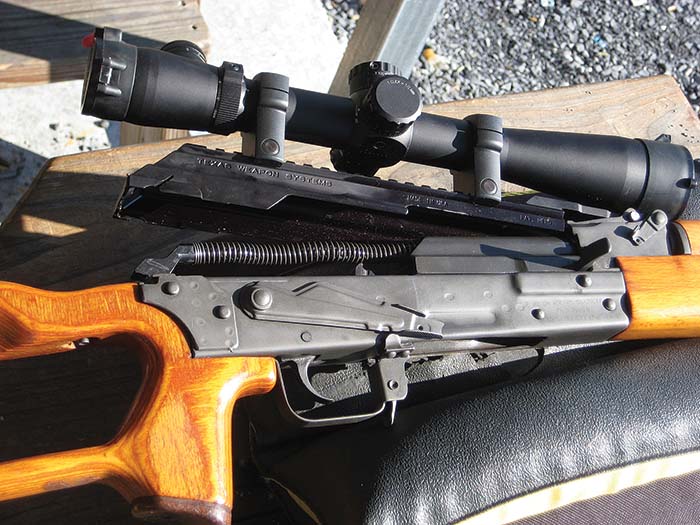
Rifle Dynamics’ and TWS cover improvements were quickly born out with the same surplus ammunition that performed in the 4 MOA range before modification turning in consistent 3 MOA performance. As expected, the other loads did better with the Wolf Gold Ammunition 150gr FMJ giving just at 2 MOA, the Barnaul also near 2 MOA, and the Sellier & Bellot 174gr HPBT a pleasant surprise at hovering near 1.5 MOA. Overall, this is pretty consistent accuracy. Jim Fuller pointed out that PSLs are known for their proclivity for preferring certain types of ammunition over others with no rhyme or reason as to why. I am fortunate that this particular rifle shoots tested brands relatively close in performance with points of aim that are relatively stable.
The PSL’s buttstock is shorter than what U.S. shooters are used to and the stock’s short comb height generates complaints from some users. The coming together of other features such a Rifle Dynamics’ improvements combined with the TWS Dog Leg dust cover led to more dedicated search for improving the stock arrangement. Black Horse Arsenal proved the answer with their authentic Russian Izhmash SVD Dragonov sniper rifle composite stock modified to fit the Romanian PSL. The conversion of the SVD Dragonov stock to the PSL began as a project in 2006 by a Black Horse Arsenal sister company with the objective to introduce an alternative to the original PSL wood stock. The stimulus for this were relationships inside the U.S. military supply chain wanting to provide lighter and more durable furniture for the PSLs being supplied by the U.S. to post-Saddam Iraqi Army. The polymer buttstock is adjustable for length of pull with an elevated cheekpiece that swivels out of the way if desired. There is a locking lever on the bottom of the stock that locks the stock in position once the user finds their specific setting. It was decided to change out the front handguards of the PSL with Black Horse Arsenal polymer furniture as well. The lower hand guard has a slightly changed gripping surface that allows the supporting hand a more comfortable hold. The Black Horse Arsenal buttstock is attached with one hex bolt by the cheek pad and another coming up from the bottom of the pistol grip. Some PSL models will require a hole to be drilled into the receiver for attachment. The Black Horse Arsenal PSL stock was the finishing touch of bringing the PSL to its full potential offering the user the most ergonomic stock for taking advantage of the TWS Dog Leg Dust cover with Leupold scope mounted.
In layman’s terms, the 7.62x54R can be considered the Russian rimmed .30-06 in terms of ballistics (180gr @ 2,700 fps) and thus by degree a relative of the 7.62×51/.308 Win, especially with the 19 inch barrel. The Leupold M3’s adjustable turret, calibrated for 7.62×51/.308 Win proved close in elevation settings out to 500 yards as test fired at Echo Valley Training Center. Like any calibrated scope, adjustments need to be field verified for any load used. The 7.62x54R is not a high pressure cartridge. It does not rely on +26 inches of barrel to burn a slow burning powder to achieve listed velocity figures. The shortening of the PSL’s barrel has limited negative effect on velocity allowing for ballistics similar to a .308Win/7.62×51. The PSL was fired from the bench initially to verify accuracy with most testing done from prone and “dug in” positions.
The Rifle Dynamics improvements to the basic PSL combined with mounting the Leupold Mk 4 scope to the TWS Dog-Leg railed cover and using quality ammunition such as the Sellier & Bellot load has turned the PSL into a credible long range performer. The Black Horse Arsenal stock was another contributor to the equation of increasing the PSL’s performance. Proper cheekweld and positioning of hand for straight back trigger pull cannot be underestimated in relation to repeatable accuracy. The PSL’s semi-automatic capability combined with 10-round detachable magazines serve as added performance enhancements. The re-worked PSL with Rifle Dynamics tuning, TWS Dog Leg cover, Black Horse Arsenal stock, Leupold optics, and quality ammunition outperforms most shooters’ abilities with its accuracy, especially when under field conditions compared to shooting off a bench. This is not too bad for a mass produced stamped receiver rifle. As expected from an AK based action there were no issues with the PSL’s reliability throughout its various stages of development. The rejuvenated PSL proved great to carry afield during training and is a potent hunting rifle in its own right. An accurate, reliable, rugged semi-automatic rifle featuring a 10-round detachable magazine of hard hitting 7.62x54R can find many uses.
Sites of Interest
Texas Weapon Systems (TWS)
10900 Research Blvd
Ste 160-C/#32
Austin, TX 78759
(512) 554-1136
www.texasweaponsystems.com
Black Horse Arsenal
(541) 487-4246
www.blackhorsearsenal.com
Rifle Dynamics
(702) 860-7774
www.rifledynamics.com
Sellier & Bellot
www.sellier-bellot.cz
Century International Arms
430 South Congress Ave. Suite 1
Delray Beach, FL 33445
(800)-527-1252
www.centuryarms.com
Echo Valley Training Center
www.echovalleytrainingcenter.com
Leupold & Stevens, Inc.
14400 NW Greenbrier Pkwy
Beaverton, OR 97006
(800) LEUPOLD
www.leupold.com
Wolf Ammunition
PO Box 757
Placentia, CA 92871
(888) 757-9653
www.wolfammo.com
| This article first appeared in Small Arms Review V16N4 (December 2012) |



